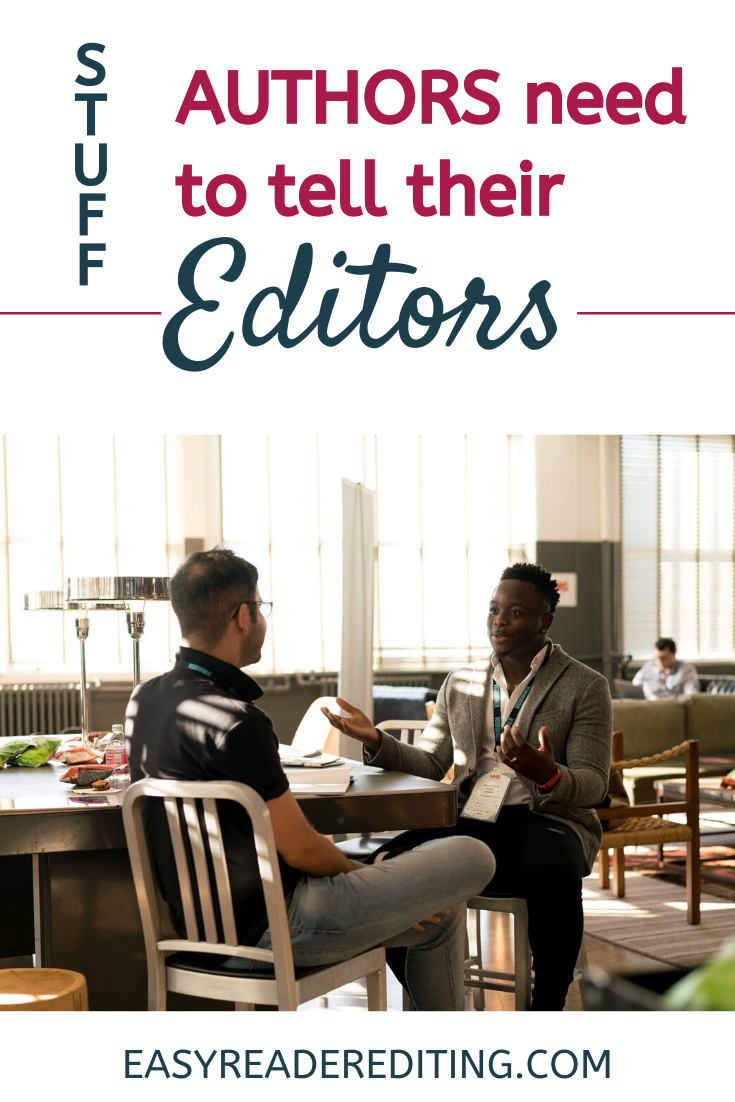The Stuff Authors Need to Tell Their Editors
Communication is the key to success
Image credit: nappy from Pexels
The best working/professional relationships are the ones with good communication. It’s no different when an author is preparing to work with an editor. If you want your book to be the best it can be, your communication needs to be thorough so the editor can do their best. The more information an editor has prior to even considering or starting the work, the better the end product will be.
So what are the main things we need to know from you before an agreement is reached and a contract is signed?
Word count
Knowing the word count of your book is important. Knowing the number of pages isn’t.
Knowing your word count allows an editor to accurately gauge how long the job will take to complete, which in turn assists in giving you a more precise pricing estimate. If I can copyedit 2000–3000 words per hour on an average level manuscript, for example, that’s 8–12 pages per hour. That translates into 25–50 hours of work for me on a 50,000-word manuscript since I do two rounds of edits. That, in turn, tells me to set aside about two weeks for your book, since it’s not feasible to edit longer than five hours in a day (for concentration as well as eyesight concerns).
If you tell me your book is 200 pages, I might assume it’s roughly 50,000 words, because the industry standard is 250 words per page. But how many average Joes know that tidbit of information? And what if your font is 10 point with narrow margins because you didn’t want to waste paper when you printed it to review? Those two weeks I’ve set aside may well turn into four weeks because the word count is much higher than was initially anticipated, which means we’ll need to renegotiate the contract terms and pricing.
Conversely, what if there are pictures on most of the pages? Do you want to be charged by the page if some of them only contain a couple sentences? Page price doesn’t vary.
Word count is also important because even though there are no hard and fast rules, there are expected word count ranges for certain genres. Your editor may advise you that your middle-grade mystery would work better around 40,000 words and not 70,000, or that science fiction readers want something more substantial to chew on than 50,000 words.
Genre
You can find an editor for everything. Fiction, nonfiction, cookbooks, board games, and more. Most editors will benefit from knowing the genre you’re writing in, for your sake and theirs.
I don’t edit poetry, for example, because I don’t read enough of it to do justice to an edit. I can check for typos, but otherwise, the . . . alive-ness . . . of a poem makes for some subjective editing choices I’m not well-versed enough to make. (Pun not intended, but feel free to enjoy it anyway.)
Some editors do fiction only, whereas others (like me) prefer fiction but will edit certain types of nonfiction. Some specialize in academic texts or medical journals, and others prefer children’s books. Sweet romance over sizzling erotica. All things paranormal over true crime. The list goes on.
We know our skills and we know our interests, and what works best is when an author’s writing and an editor’s skill set align.
Trigger warnings
This goes along with genre. Because I don’t edit erotica, I want to know if there are graphic sex scenes in the book I’m going to edit if the book itself doesn’t fall into the erotica category. I’m no prude, but I don’t like surprises when it comes to that either.
I’ve heard from several editors about reading through a manuscript and suddenly coming upon a violent scene or descriptive trauma that bothers them so much that they wish they’d never taken on the job—sometimes to the point where they need to cancel the contract.
Please, writers, tell your editor if there’s any disturbing content like rape, gore, child molestation, animal abuse, or similar things in your manuscript. You don’t know what that editor has lived through, and it won’t matter a bit to them if it serves the plot or not when your book triggers a PTSD episode because they were caught unaware.
What type of editing do you want?
[Warning: lots of super helpful links ahead!]
Do you know what your book needs? If your MS has had any editing done to it, what was done? If you’ve had developmental editing, you’re probably ready for copyediting now and maybe some line editing. If you’ve only had beta readers, you may need something more in-depth or your writing may be solid enough that you don’t need the developmental editing. If it’s been copyedited, you’re most likely shopping for a proofreader of the formatted MS.
See my previous blog post about the different types of editing for more information.
If you need a developmental editor or story coach, then you're wasting your time (and the editor’s time) if you’re checking out a copyeditor. If you need the detailed work of a proofread but the editor you’ve found specializes in manuscript evaluations only, move on.
What’s your market?
Who are you writing for? Some writers are surprised when they’re asked this question. The genre should speak for itself, they say.
To a point, yes. But let’s say your personal growth book has spiritual “come to Jesus” undertones, and another personal growth book has a “pull yourself up by your bootstraps and hike the wilderness” feel. Those will appeal to very different portions of the market.
You may want the entire world to love your memoir, but let’s say you’re a celebrity in the sports arena. Your readers are most likely going to be fans of yours, or at the very least, fans of the sport you play. You may get an occasional “I’ve heard that name” curiosity seeker, but if someone doesn’t enjoy or follow sports, they’re not really your audience.
But what if you’re a not-famous person? Do you plan on submitting your memoir to an agent or publisher, or do you only want to print enough copies to give to your family to keep the history alive?
File format
Professional editors prefer to edit in MS Word. Whether you like writing in it or not, that’s where we’re able to add our software, macros, and other tools to make the job faster and easier, so get that manuscript converted to a doc or docx for simplicity when you send it.
Scrivener is a great program authors really love, and it converts well for editing in Word. Open Office or one of the “free, just like MS Word” programs are, I guarantee you, not just like MS Word, and your editor won’t do the edits in one of those programs either. Writing in Pages? No. And no again. It’s not compatible with anything, it seems.
Do you prefer Google docs? Unless you’re submitting a short piece, your editor will probably open it in Word, do the edits, and then load it back into Gdocs, because again, the helpful tools we can add to our Word program are too precious to skip using. Longer manuscripts are a nightmare to navigate and edit in Gdocs, and most editors who are forced to use it by circumstance will still make their own copy of the document so they’re not subject to the author(s) watching their every move on a shared doc—or worse, making changes while the edits are happening.
PDFs are complicated for copyediting but not so bad for proofreading (and almost standard for a formatted manuscript), so again, it all depends on what stage you’re at and how long your document is, but Word is the bomb for editing.
Time frame
When do you want to start, and when do you plan to publish? Those two questions are essential to have answered before hiring. In fact, I would even say they should be answered before some of the other items listed above.
I once lost a potential client who was happy with the sample edit I did, wasn’t put off by the total cost, and was pleasant in all communications—right up to the point when I told him I could start the job in six weeks. He’d never stated a specific deadline or start date—or any kind of timeline at all—but then chastised me for not telling him I wasn’t available right away.
I was a newer editor back then, but I had more-than-steady work and had recently learned to stop pushing my limits, so I’d given the six-week start date to make sure I wasn’t overdoing it. What bothered me more than losing a potential client was the fact that he was genuinely offended and acted as if I had been deceitful, when in reality I was just ignorant of his calendar.
Are you flexible? Are you self-publishing, or do you have plans to submit to an agent by the time a particular convention rolls around in three months? Do you already have a formatter booked because you thought your book would be done sooner than it was, and then your beta readers were late and your revisions were late, and you have to get that copyedit faster than planned?
Tell your editor. Sometimes they can accommodate a rush job and sometimes they can’t. Sometimes they can squeeze you into an already full schedule as long as you don’t mind it taking some time to finish.
What’s your budget?
If you’ve never shopped for an editor, you may end up with a bit of sticker shock. Much of that is because the average reader or writer doesn’t think about how long it takes to edit a book—spoiler alert: longer than reading it for pleasure.
I mentioned in the word count section above that it can take up to 50 hours to copyedit an average-length fiction book. I worked on a heavy edit a few years back that took me 80 hours of intense work. The nonfiction books I’ve worked on take significantly longer, because of fact-checking, verifying the spelling of real people and places, and all the “how do I even check the truth of this?” moments. More time means more money involved.
It’s smart to mention your budget up front to any editor you’re considering. Many editors post their per-word or hourly rates on their websites, so it’s easy to sift out the ones you can’t afford right off the bat. However, if an editor doesn’t have those numbers publicly available, that often means they provide an estimate based on the project scope and complexity. Everyone works differently, so neither way is wrong, but telling the editor your budget can either reassure you that they can work within it, or it can eliminate wasted time on their part.
Put it all on the table
The sooner you mention these items to the editor(s) you’re considering, the faster and easier the entire hiring process should go. It’s always better to have as much information as possible so you can both make an informed decision about whether to take the next step.
Happy writing!


